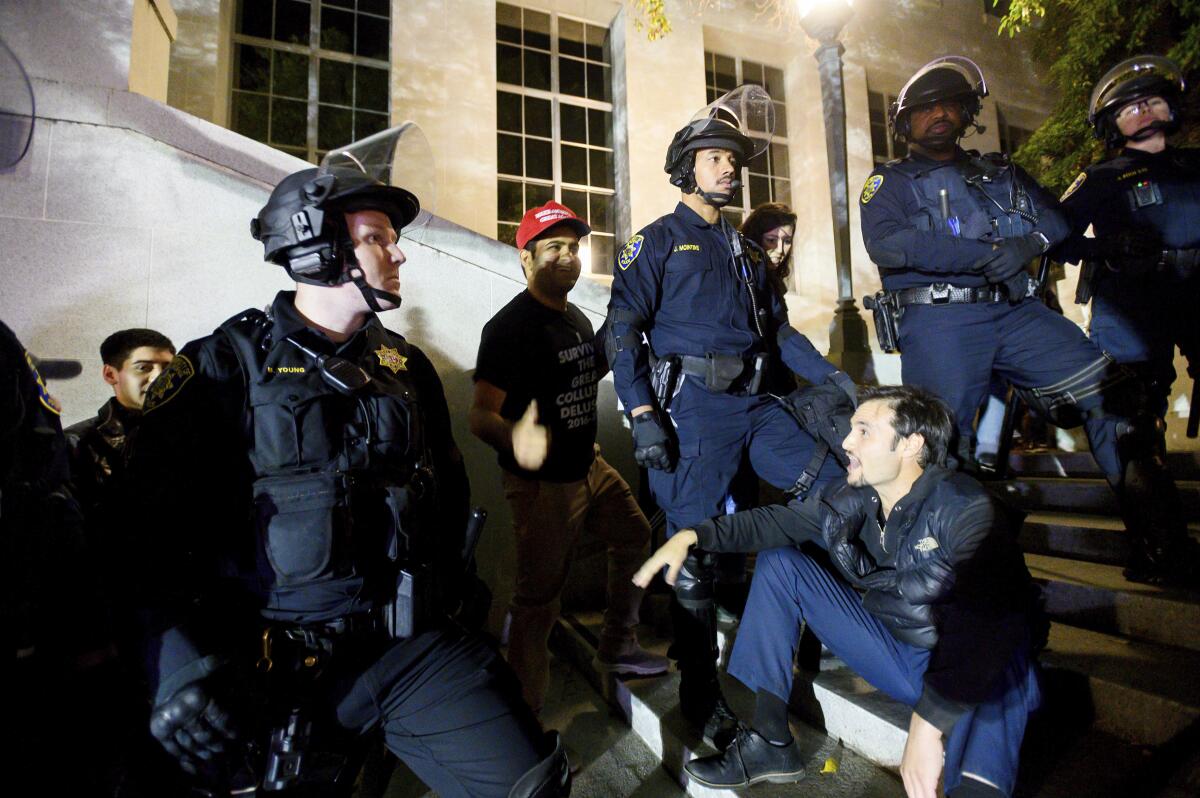UC Berkeley keeps a lid on 2,000 protesters, allowing conservative commentator Ann Coulter to speak

The protesters gathered 2,000 strong, demanding the crowd shut down a talk about immigration by right-wing commentator Ann Coulter at UC Berkeley this week.
Some wore black. Some marched in a circle, yelling anti-Coulter chants. Some waved signs calling Coulter a racist who supports fascism, ethnic cleansing and white supremacy. In diverse and liberal Berkeley, the student and community protesters were particularly riled up by Coulter’s anti-immigrant slams in her 2015 book, “Adios America! The Left’s Plan to Turn our Country into a Third World Hellhole.”
But Coulter came. She spoke. She left.
And it all occurred without major problems — the kinds of violent protests that shut down a 2017 Berkeley appearance by conservative provocateur Milo Yiannopoulos, drew national headlines and prompted President Trump to threaten to cut off the university’s federal funding.
“What was significant ... was what didn’t happen,” UC Berkeley spokesman Dan Mogulof said Thursday. “We did not see the sort of violence, mayhem and property destruction that attended to the event with Milo Yiannopoulos.”
Police arrested five people, including three students for resisting law enforcement. One person was injured during a scuffle with a protester. There was no property damage during the talk, attended by about 400 people.
Matt Ronnau, president of the UC Berkeley College Republicans, which invited Coulter, said as many as 100 students may have been blocked from attending by protesters who linked arms as a human barricade near the entrances. He also said a few students reported that knives were pulled, but Mogulof said police have received no such reports.
Ronnau, however, said the event went well overall and praised UC police officers for their work.
“The rank-and-file ... always does a fantastic job,” he said. “If not for them, we could have had a very bad situation similar to Milo in 2017.”
Mogulof said protesters were “passionate and agitated” and that many came determined to end the talk. But this year the campus was ready after Chancellor Carol T. Christ, who took the helm in 2017, began working with UC police to improve crowd control methods and launched “Free Speech Year” with panels to demonstrate how to exchange opposing views in a respectful manner and learn about the 1st Amendment.
At the Coulter event, Berkeley kept control thanks to the “extraordinary professionalism” of police, crowd control lessons learned from the 2017 protest and students who followed rules for campus events, which were modified last year, Mogulof said.
Police forces from nine UC campuses, along with backup from the California Highway Patrol, stood at the ready.
Mogulof declined to provide details about how many police were deployed but said all undergraduate campuses except UC Santa Cruz sent officers. UC campuses almost always prefer to use their own police, Mogulof said, because they are specially trained in protest management and best understand the university system’s priority on public safety and free speech rights.
Since the Yiannopoulos protest, he said, Berkeley has spent more than $4 million on security measures and made changes in how law enforcement gathers information, deals with outsiders coming to campus, deters plans to stir up violence and secures the speaking venue.
Berkeley has cracked down on the wearing of masks, for instance, in line with a longstanding state law barring them to avoid detection by police. The university toughened its policy after many Antifa members and other protesters wore masks while storming the campus during the Yiannopoulos event. On Wednesday, those wearing masks were asked to remove them, Mogulof said.
Another change that has helped keep the peace, Mogulof said, is that student organizations are now closely adhering to a policy that spells out the process for holding major campus events, including requirements for advance notifications, deadlines and planning meetings. The policy was modified last year to clarify the responsibilities of both the campus and student organizations as part of a legal settlement with conservative students who complained the campus arbitrarily threw up barriers to their proposed events, impeding them from hosting speakers.
Since the Yiannopoulos event, the College Republicans have held campus forums with a host of conservatives, including Ben Shapiro, Dennis Prager, Rick Santorum, Charlie Kirk and Sean Spicer.
“Every single one of them went off without incident, without trouble of any sort whatsoever,” Mogulof said.
The Coulter talk drew the most protests since 2017, however. The event was chronicled in detail on Twitter by The Daily Californian news reporters as well as members of the Berkeley College Republicans.
After her talk, Ronnau described Coulter as “one of the nicest people I’ve met who is the farthest thing from a white nationalist and Nazi.”
She told students she supported a wall on the southern border to stop illegal immigration and a moratorium on legal immigration so the nation could first “take care of its own people” who are facing homelessness and crime-ridden neighborhoods, Ronnau said.
Ronnau, a senior majoring in statistics, agreed that Berkeley has significantly improved its climate for free speech.
“It’s definitely improved and we’re very grateful for that,” he said.
More to Read
Start your day right
Sign up for Essential California for news, features and recommendations from the L.A. Times and beyond in your inbox six days a week.
You may occasionally receive promotional content from the Los Angeles Times.







